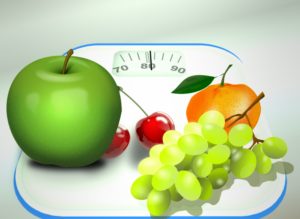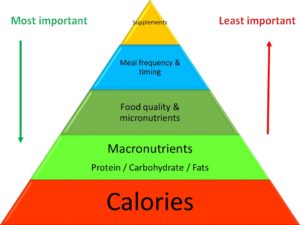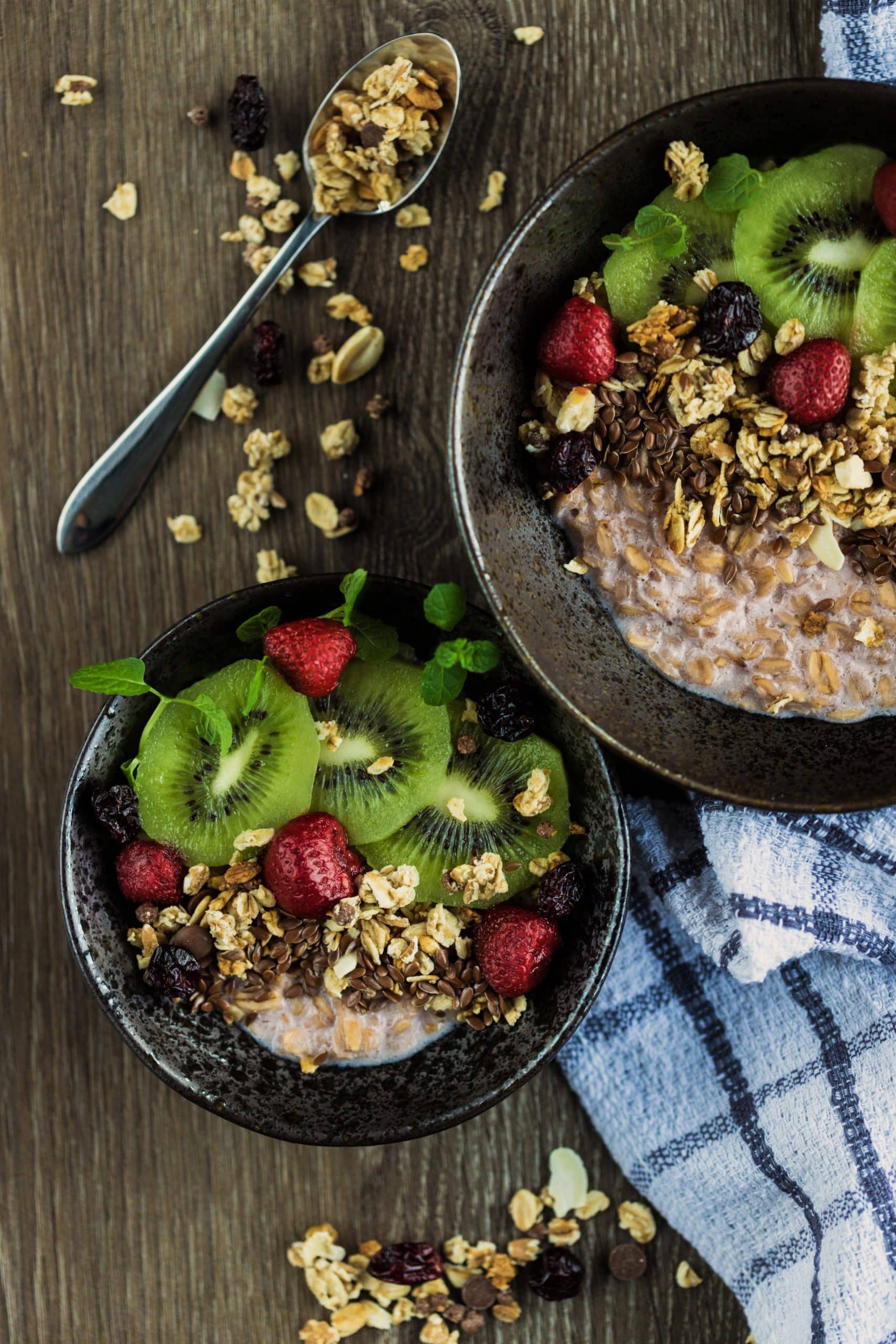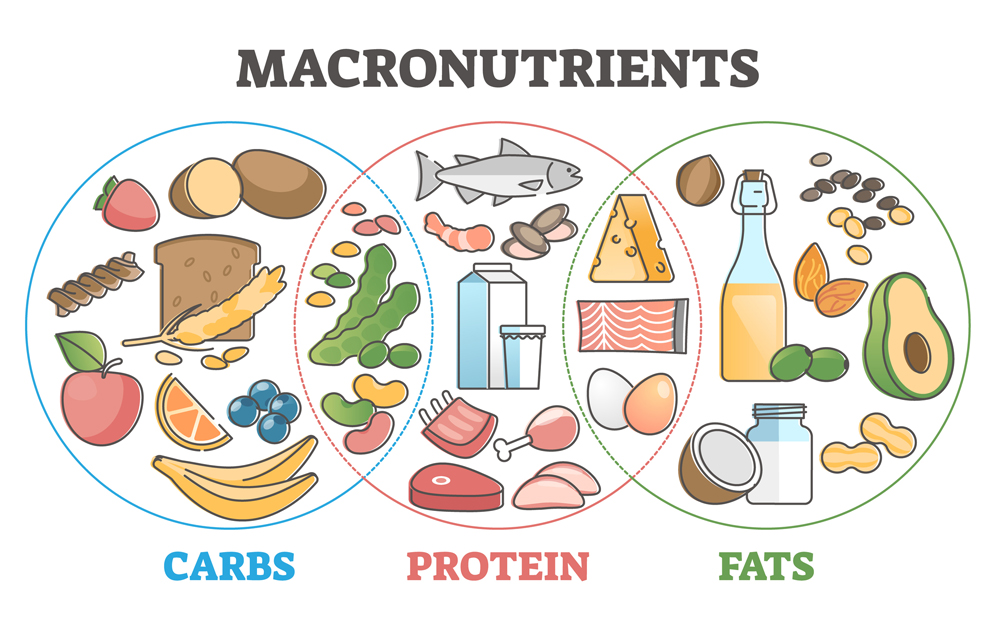https://www.youtube.com/watch?v=t_Uff0Sppak
Macro Counting – Pros and Cons
Nutrition has come into sharp focus over the last couple of years and with it has come many different approaches to how we learn and how we educate about nutrition. One popular form of nutrition coaching is macronutrient counting or “if it fits your macros” as it’s also known as. In simple terms what this means is splitting your macronutrients, which are carbohydrate, fat and protein into specific daily targets or percentages to meet a calorie target. The calorie target is often to create a deficit for fat loss but it can also be used to achieve a calorie surplus for building lean mass or indeed just to maintain a calorie balance.

An example of a macronutrient split
Carbohydrate 300g = 1200 calories
Fat: 80 g = 720 calories
Protein: 200g = 800 calories
Total calories = 2720

The advantages?
The main advantages of this form of nutrition education are as follows:
- Better understanding of calories and macronutrients in food
- Improves accountability and helps people stay on track with their specific nutrition plan
- Can help people more effectively and efficiently achieve body composition goals
- It provides a simple format for people to follow
What to be conscious of when counting your macros
The issue that can arise with macro counting is that it doesn’t focus on sound habit formation, food quality and micronutrients, or how food makes you feel. Some people adopt the approach of eating whatever they like as long as it ‘fits their macros’. You can achieve a calorie deficit, balance or surplus from any type of food but choosing nutritious foods like fruit, vegetables, nuts and seeds will benefit your long term health while processed foods like sweets, ice-cream and biscuits certainly won’t contribute much nutrients to your body and keep you feeling energised. As you well know I am a firm believer in the skills of cooking, investing in food preparation and sharing recipe ideas. Eating a nourishing meal should always be your first priority with the next focus being on whether it includes the sufficient protein, appropriate carbohydrate and fats.

Optimum nutrition is also about variety, how strong our immune system is, eating to our likes and how vibrant and energetic we feel from eating food we enjoy. All of those things are fundamental and relate directly back to our lifestyles and nutrition. Food is significantly more than a number and it certainly must be enjoyed. If you are meticulously counting the macronutrients that you eat it can cause frustration and take away from your meal. There are situations where a person only focuses on tracking their macronutrients and not working on the broader aspects of their relationship with food and their habits and it can often happen that they miss the bigger picture with nutrition. They become too focused on specific nutrients and it can actually damage their relationship with food, and may even develop into an obsession.

Nutrition information on daveynutrition
If you have read my book or if you are a PRO member on my website you will see that there is a calculator to calculate your specific need for calories and macronutrients and all my recipes and meal plans have detailed nutrition information. This is for a few key reasons that centre around education; firstly, it helps you understand your specific daily energy and macronutrients needs, secondly, it helps you to understand how each recipe fits your goal and thirdly, it helps you understand exactly what types and how much of each food to eat to achieve a goal. The advantage of using these tools as a PRO member is that you have total flexibility to choose recipes that you like and are nutrient dense. It also encourages sound habit formation because you prepare and cook your own meals, and this means you are fully invested in your overall nutrition and not just the numbers associated with the food you are eating.

Macros in elite sport and how it can work positively
If I was to take the average athlete that I work with, even at the very, very top level, intermittently they may track just to make sure that they’re meeting their needs for energy, carbohydrates, protein and fats on a daily basis or indeed in preparation for competition. It isn’t something that they do on a consistent basis. If somebody wants to self-educate or keep themselves accountable, journaling or tracking is a great little exercise to do. But it’s certainly not necessary if people have a good handle on their nutrition and they are comfortable with their body-composition. If you are to use tracking your macronutrients for either education or accountability it is worth looking at other behaviours too. Using a journal to plan your week and review your nutrition is an effective way to reflect on your overall lifestyle and help you to consider the whole picture for sustainable health and performance practice.

In summary
If you are getting sufficient physical activity, you are an optimum weight, you are eating a sufficient variety of nutritious foods and you are in good health then you certainly don’t need to obsess about tracking your foods. However if you want to improve your understanding of macronutrients and what foods provide you with different nutrients or if you want to create a level of accountability then tracking your macronutrients can be used, particularly for a short to medium term period. The major advantage of using the daveynutrition meal plans is that it makes planning and alignment of your nutrition to your goals very simple. It encourages people to form the essential habits associated with achieving long term health and wellbeing like nutrition education, food preparation, and cooking. Finally you can achieve your health or performance goals by eating delicious simple to prepare meals!








